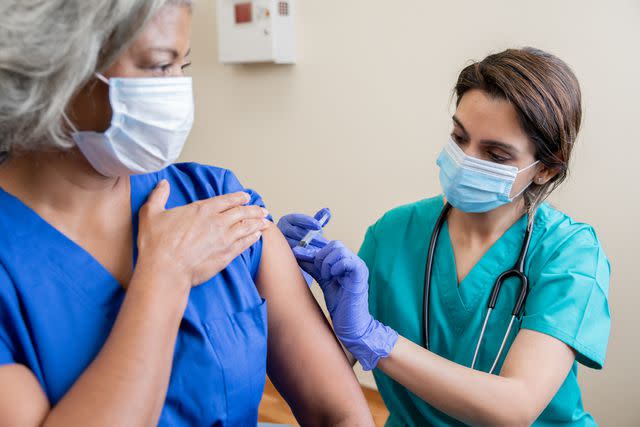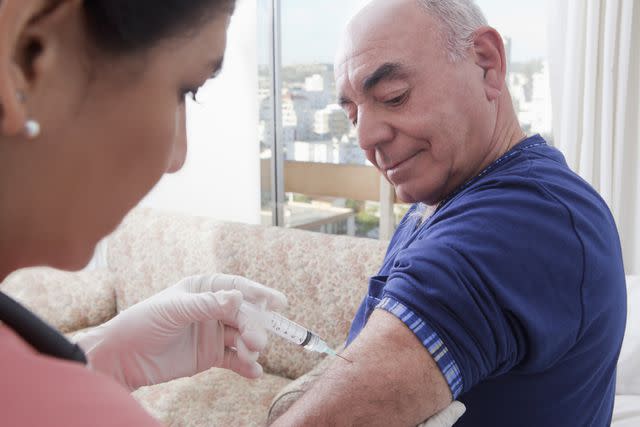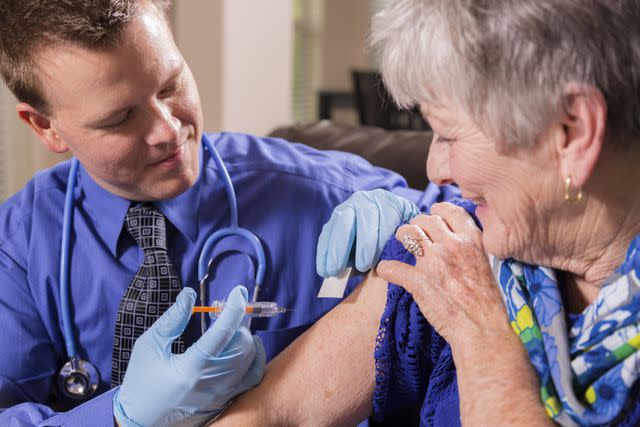These Are the Vaccines That Medicare Covers
What vaccines do you need and are they covered?
Medically reviewed by Geetika Gupta, MD
People tend to think of children when they think about vaccination. There is no question that certain vaccines are recommended for babies, toddlers, adolescents, and teens, such as those that protect against measles, mumps, and rubella.
However, there are also vaccines that are crucial for older adults, including those that prevent shingles as well as booster shots to ensure ongoing protection against diseases like tetanus.
Medicare recognizes this and covers many vaccines during adulthood. Not all vaccines are covered in part or in whole by Medicare, but those recommended by the Advisory Council on Immunization Practices (ACIP) are more likely to be.
With passage of the Inflation Reduction Act in 2022, there is no longer cost-sharing for ACIP-recommended vaccines as long as you remain in your plan's network. It is possible you could be asked to pay for the vaccine upfront in some cases but your plan must reimburse you for it.
Related: Top 20 Vaccines You Should Know About
RSV Vaccine
Respiratory syncytial virus (RSV) causes respiratory illnesses in millions of people every year, affecting people young and old. According to the Centers for Disease Control and Prevention (CDC), the virus accounts for as many as 80,000 hospitalizations and 300 deaths in children 5 years old and under. People 65 and older have even higher rates of hospitalization (up to 160,000 per year) and death (up to 10,000 per year).
A vaccine against RSV was approved by the Food and Drug Administration in May 2023. Medicare Part D covers the vaccine which at this time is a one-time administration.
The ACIP currently recommends RSV vaccination for pregnant women if they are at 32 to 36 weeks gestation during RSV season which tends to start in the fall and peak in the winter. The goal is to prevent RSV infection in their newborns, which could be potentially life-threatening.
They also recommend RSV vaccination for people 60 years and older with shared clinical-decision making. For example, you may consider vaccination if you have chronic medical conditions that increase your risk for infection. Be sure to talk with your healthcare provider about your options and whether this vaccine may be right for you.
COVID-19 Vaccines

Courtney Hale / E+ / Getty Images
In March 2020, the World Health Organization declared the COVID-19 outbreak a pandemic. In response, governmental, pharmaceutical, and biotechnology organizations took action worldwide in search of a vaccine.
Three COVID-19 vaccines have been granted emergency use authorization (EUA) or have been approed by the U.S. Food and Drug Administration (FDA):
Moderna: Available to people 6 months and older
Pfizer-BioNTech: Available to people 6 months and older
Novavax: Available to people 12 years and older
When the Coronavirus Aid, Relief, and Economic Security (CARES) Act was passed in March 2020, it directed that vaccines for COVID-19 would be covered for all Medicare beneficiaries. Not only that, there would be no cost-sharing for the vaccine itself or for the administration of the shot.
This was a break from tradition in that most vaccines are covered only when they are formally granted FDA approval rather than EUA. Of note, the FDA gave full approval for the Pfizer-BioNTech vaccine for people 16 years and older in August 2021. The FDA gave full approval for the Moderna vaccine for people 18 and older in January 2022.
The CDC recommends that everyone 6 months and older receive the COVID-19 vaccine and a booster if eligible.
Updated bivalent doses from Pfizer-BioNTech and Moderna were first authorized as boosters and later replaced all of the original, monovalent doses. These were then replaced by the 2023-2024 updated formula targeting a newer variant. The CDC recommends one dose of the updated 2023-2024 vaccine for all people 5 years and older to be considered up-to-date.
In limited situations, a monovalent Novavax booster dose may be used in people ages 18 and older who are unable to receive an mRNA vaccine. In specific immunocompromised individuals, an additional primary mRNA dose is recommended.
Takeaway
Medicare recipients receive the COVID-19 vaccine for free, and the cost of the office visit is free of charge. However, it is important to note that other issues discussed at the same visit can still be billed.
Related: Is the COVID-19 Vaccine Free If You’re Uninsured?
Annual Flu Vaccine

REB Images / Getty Images
Influenza (flu) is a viral infection that affects tens of millions of people across the planet every year. As influenza mutates rapidly, the most common strains change each flu season, and a new vaccine is required every year.
The Centers for Disease Control and Prevention (CDC) estimates that there were around 5,000 flu-related deaths in the United States during the 2021-2022 flu season.
ACIP recommends that anyone 6 months of age and older gets vaccinated against influenza every year. This is especially true for older adults, people who are immunocompromised, or those with asthma, diabetes, or heart disease.
Accordingly, Medicare covers flu vaccination once every fall-winter season under its Part B benefit. The benefit will not cost you anything if your healthcare practitioner is a Medicare provider.
Three flu vaccines are recommended specifically for adults 65 and over and they are also covered by Medicare: Fluzone High Dose Quadrivalent, Flublok Quadrivalent, and Fluad Quadrivalent.
Related: Who Should Not Get a Flu Shot
Pneumococcal Vaccines

Pneumonia is a lung infection that can be caused by bacteria, viruses, and even fungi. Symptoms include fever, cough, and shortness of breath. According to the CDC, there were more than 1.5 million emergency room visits for pneumonia in 2020 and 41,309 deaths in 2021.
The pneumococcal vaccine protects against potentially deadly bacteria called Streptococcus pneumonia.
There are several different Pneumonia vaccines available. The CDC recommends PCV15 or PCV20 for people 65 and older who have never received a pneumococcal conjugate vaccine or whose previous vaccination history is unknown. In case PCV15 is used, PPSV23 should be administered one year later.
Keep in mind, however, that Medicare only pays for one dose of each vaccine. Any additional pneumonia shots, even at the recommendation of your healthcare provider, may come at an additional cost. This is the case even if you have an underlying lung condition, such as COPD, that puts you at higher risk for pneumonia.
Related: What to Know About the Pneumonia Vaccines
Hepatitis A and Hepatitis B Vaccines

Hepatitis A and hepatitis B are viruses that attack the liver. Hepatitis A is commonly transmitted through contaminated food. Exposure to hepatitis B typically occurs when you come into contact with the blood or bodily fluids of an infected person.
In 2020, the CDC estimated 14,000 acute hepatitis B infections and 11,635 new chronic hepatitis B infections in the United States. In addition, the CDC estimated that 19,900 people were newly infected with hepatitis A in 2020.
Because almost everyone recovers from hepatitis A without treatment, Medicare Part B does not cover hepatitis A vaccination. It also limits coverage of the hepatitis B vaccine to those considered to be at a medium to high risk of infection or disease complications. These include people with:
Living with someone with hepatitis B
Healthcare workers who come into frequent contact with blood or bodily fluids are also considered to be at high risk.
Takeaway
Even if you do not fall into these designated risk categories, Medicare Part D and possibly your Medicare Advantage plan may cover hepatitis A or hepatitis B vaccination if they are deemed medically necessary.
Related: How Hepatitis Is Transmitted and Not Transmitted
Shingles Vaccine

Once you have chickenpox, the virus that causes it lives in your body forever. If you are lucky, it will never bother you again. However, for one in three people, the virus will reactivate at some point and cause shingles.
Although shingles is typically self-limiting, it can cause a long-lasting pain syndrome called post-herpetic neuralgia in as many as 10% to 15% of cases. If shingles occurs near the eye or optic nerve, it can cause vision loss and even blindness.
There is one vaccine for shingles approved in the United States called Shingrix. It is an inactivated vaccine delivered in two doses two to six months apart.
Despite its high level of efficacy, Shingrix is not covered under the Medicare Part B umbrella. Certain Medicare Advantage plans or Part D plans cover one or both of the vaccines. Check your plan's drug formulary for details.
Tetanus Vaccine

Tetanus is an infection caused by bacteria called Clostridium tetani that typically enter the body through breaks in the skin. It is not common in the United States, but it remains a public health problem in other countries, with 34,684 reported cases globally in 2019.
Tetanus is not common in the U.S. due in large part to widespread tetanus vaccinations in children and adults. Tetanus shots are first given during childhood (typically as part of DTaP or Tdap vaccination), while adults are encouraged to get booster shots every 10 years.
Medicare Part B pays 100% of the cost of a tetanus shot but only in specific cases. People with diabetic neuropathy, for example, often lack sensation in their feet. The shot is considered important for these individuals after an injury, as they may not realize that their foot has been contaminated.
In other cases, a person may sustain an animal bite or step on a nail and be given the shot afterward to protect against infection.
Unless there is an injury or a demonstrated need for the vaccine, you may need to turn to Part D to see if the tetanus vaccine is covered.
Indications for Tdap Vaccination
In addition tetanus shot, it is also recommended that you get either a Td (which protects against diptheria and tetanus toxid) or Tdap (which protects against tetanus, diphtheria, and pertussis (whooping cough) booster as an adult, It is also recommended during the third trimester of pregnancy.
However, the Tdap vaccine is currently not covered under the Part B benefit but will likely be covered by your Medicare Advantage plan or Part D plan.
A Word From Verywell
Even if Medicare does not cover all of these vaccines for free, it may be in your best interest to get them anyway to protect yourself and adhere to the current ACIP recommendations. This is especially true as you get older and are more prone to disease complications.
If you don't know which vaccines you need, speak with your healthcare provider, who can review your medical records and help you catch up.
Related: The 6 Vaccines All Grandparents Should Get
Read the original article on Verywell Health.

